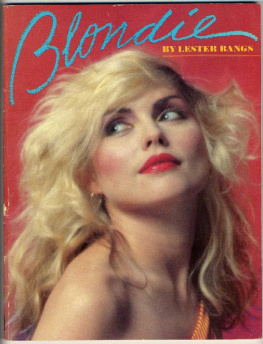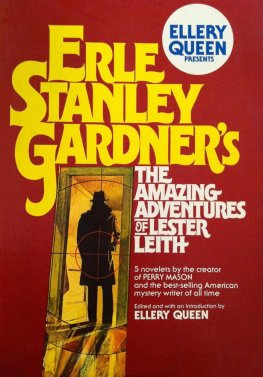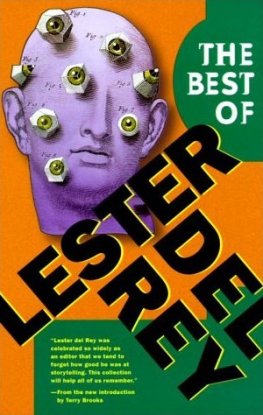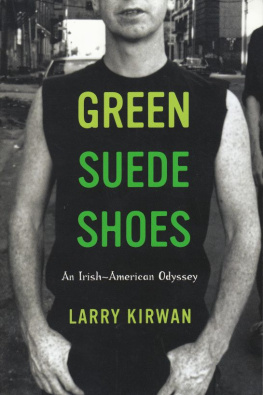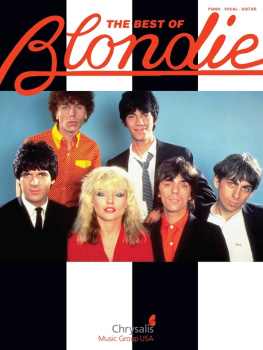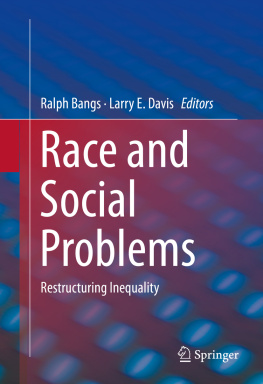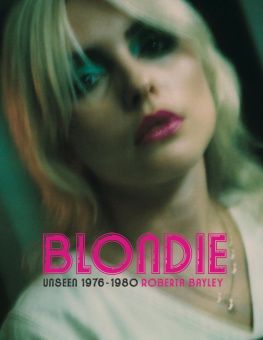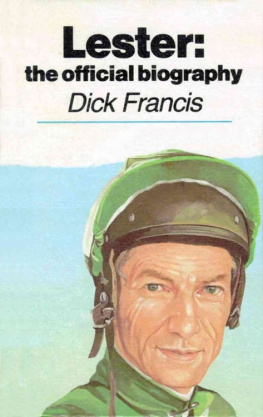Lester Bangs - Blondie
Here you can read online Lester Bangs - Blondie full text of the book (entire story) in english for free. Download pdf and epub, get meaning, cover and reviews about this ebook. year: 2012, genre: Detective and thriller. Description of the work, (preface) as well as reviews are available. Best literature library LitArk.com created for fans of good reading and offers a wide selection of genres:
Romance novel
Science fiction
Adventure
Detective
Science
History
Home and family
Prose
Art
Politics
Computer
Non-fiction
Religion
Business
Children
Humor
Choose a favorite category and find really read worthwhile books. Enjoy immersion in the world of imagination, feel the emotions of the characters or learn something new for yourself, make an fascinating discovery.
- Book:Blondie
- Author:
- Genre:
- Year:2012
- Rating:5 / 5
- Favourites:Add to favourites
- Your mark:
- 100
- 1
- 2
- 3
- 4
- 5
Blondie: summary, description and annotation
We offer to read an annotation, description, summary or preface (depends on what the author of the book "Blondie" wrote himself). If you haven't found the necessary information about the book — write in the comments, we will try to find it.
Blondie — read online for free the complete book (whole text) full work
Below is the text of the book, divided by pages. System saving the place of the last page read, allows you to conveniently read the book "Blondie" online for free, without having to search again every time where you left off. Put a bookmark, and you can go to the page where you finished reading at any time.
Font size:
Interval:
Bookmark:
BLONDIE by Lester Bangs
POOR DAGWOOD, DEAD AND GONE, LEFT ME HERE TO SING HIS SONG
A BRIEF CHRONOLOGUE
JANUARY 1977: I had just reviewed a group off New York City's CBGB-nascent punk rock circuit called Blondie for the Village Voice. All my friends had said they were a waste, but I found their first album a charming, even inspiring piece of American rock 'n' roll from traditions as diverse as early Sixties girl groups, Question Mark and the Mysterians, and the Velvet Underground. So, under the title "Blondie is More Fun," I gave it what probably amounted to a rave review; in those days, when seemingly everybody else around except the Ramones and Dictators were taking themselves so seriously, Blondie were refreshing. One day the phone rang; it was the band themselves, calling me up to thank me. We chatted a bit, and at one point I asked them what else besides rock they were into.
"Japanese culture," one of them said.
"You mean like Yukio Mishima?" I asked.
"No," they said, "we mean like Japanese monster movies!"
Not long after that Private Stock, their record company, sent me a big poster of Deborah Harry, their lead singer, in a see-thru blouse. I duly tacked it up on the wall, though even at the time I had to admit I didn't find it that sexy, and my girlfriend, far from taking offense at this bit of sexist exploitation, just thought she looked sad.
MARCH 1977: I got to see Blondie for the first time, opening for Iggy Pop at the Palladium in New York, one of their first gigs in a big hall. They were all kind of clumsy out there, not least the girl lead singer, miniskirt, California GTO-cruisin' sunglasses and all. But just like their record they were fun in the flesh, and in fact it was perhaps the band's very awkwardness that made them endearing. After Iggy'd chilled our hearts and blown our brains out the door with that one wild shout that ended "T. V. Eye" alone, we all came away filled with his fire but also thinking and talking about how utterly cute without the slightest hint of the cloying Blondie were. My crowd, rock critics of all shapes and sizes and eras, were unanimous in feeling really kind of filially/fraternally supportive of them. They felt like spiritual rock 'n' roll family, which for all his anomic maelstroms was something one could never quite say about Iggy, unless he was, perhaps, three generations of ghosts, howling deep into the wells and crevasses of the Seventies to see just who else might have fallen down there.
OCTOBER 1977: I was in London, staying at author/ record producer/disc jockey Charlie Gillett's house, recuperating from six days on the road with the Clash. He mentioned one day that Blondie were playing somewhere in town that night, and asked me if he should check them out. I gave them a big buildup, and he came back that night almost a little miffed at me for wasting his time on something he considered so lame. A day or two later I shared his Sunday afternoon Honky Tonk radio show with Blondie. They were about half fried and half exhilarated: fried because of all the touring, exhilarated because their single "In the Flesh" had gone Number One in Australia. Deborah Harry, the lead singer, must in fact have had one of the most convoluted cases of jet-lag of all time, because she had just finished flying from New York City to Australia with their manager Peter Leeds to give interviews and promote their records, and then direct from Australia to London to join the rest of them for more European touring. Interestingly enough, she seemed less wearied by all this frenetic career-goosing than the guys in the group. The first thing she did was make Charlie put on a record of Australian pigmy music recorded under the mud of the deepest Outback, "Because I wanta start helpin' pay back some of our fans in Australia for makin' us big stars there first, so here's some of their music."
I was experiencing a little difficulty in bearing up under assault by that many pigmies at once myself, and I'm a connoisseur of obnoxious music. I looked over at Charlie to see how he thought this matched up to the Drifters; he looked like he'd just swallowed a toad after losing about three pints of blood. Then I glanced at the turntable: the cut looked like it was about 15 minutes long. Debbie seemed to be in heaven; maybe, as many said of the MC5's Kick Out the Jams, you just hadda be there. The rest of the band was just sort of wandering around the studio distractedly in their black leather jackets; they all looked like they wished they were at the Gem Spa on St. Mark's Place instead.
About six minutes into the bush, Charlie finally had to take the little chooglers off before the skin started to peel spontaneously from his body.
"Well, that's enough of that," he said, and the rest of the show was divided among the Blondies, who played all their favorite current New Wave singles (Penetration, Richard Hell, Ramones, etc.) and, at the very end, me (Eno, Ray Charles, Richard Hell, Robert Quine hype). Charlie also did a brief interview with Debbie, who tensed up visibly the instant the show changed to that from a sort of record party, and he certainly didn't win any points with her by mentioning the Wind in the Willows, a hippie-folkie group she was in in 1968, thus inferring her age which is something she's been uptight about ever since I've known her, though he was too much of a gentleman to press her on it.
On another topic she was not so much touchy as adamant. "Is Blondie a punk band?" asked Charlie.
"Definitely not," responded Debbie, though she didn't seem offended by the suggestion. "We play power-pop!"
Meanwhile, whenever the records were playing, I chatted with the band. None of them seemed particularly happy to be in England/Europe for the first time-they were experiencing the usual acclimatization process American bands undergo when they storm over there for debut tours, always thinking they're gonna be the Beatles in reverse and getting undone a few nerves a day by the dreary weather, the steady diet of things like bangers and mash, the drafty hotel rooms, phones in them that might work and might not, etc. Once they figure out it's not Carnaby Street and Blow-Up but a basically worthless country where it's advisable to stay drunk like most of the natives, they generally do all right. Apparently not quite broken in yet, Chris Stein, Debbie's boyfriend and co-leader of the band with her, told me: "All their groups but the Sex Pistols, the Clash and maybe a couple others stink. The longer we're over here the more nationalistic we get." Though I had been diverted by matters Clash, I was a little surprised to hear him voice these sentiments, inasmuch as I'd gathered that England, both press and audiences, had responded fairly favorably to the group. I was just beginning to learn that the English and American (then almost entirely concentrated in New York at the eternal sleaze-haven Max's Kansas City, and a former folk club and wino hangout down Bleecker and Bowery called CBGB's) punk contingents were hardly destined to be a united front: all the Limeys thought the CBGB's bands were a lot of spoiled suburban-affluent dilettante junkies, and all the Americans thought the London safety-pin and bondage-trousers brigade were a self-righteously "political," speed-nattering mob of pogoing poseurs who were all too short, no doubt owing to their hideous culinary practices. I loved it all myself, but running into Blondie reminded me how badly I wanted to be back home myself, the sweet chitterings of the jackhammers wafting up from Sixth Avenue, sounding not unlike and possibly better than whichever new band might happen to be playing that night at CBGB's, where for once in my life I'd found a "scene" I actually felt comfortable in: a dogpound with an open-door policy to brain-damage, literal physical deformity, black leather jackets lending many a wimpy li'l thing the proper menacing carapace, and teenage heffalumps for whom beer was the Grail.
Next pageFont size:
Interval:
Bookmark:
Similar books «Blondie»
Look at similar books to Blondie. We have selected literature similar in name and meaning in the hope of providing readers with more options to find new, interesting, not yet read works.
Discussion, reviews of the book Blondie and just readers' own opinions. Leave your comments, write what you think about the work, its meaning or the main characters. Specify what exactly you liked and what you didn't like, and why you think so.

